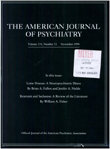Comorbidity of parental anxiety disorders as risk for childhood-onset anxiety in inhibited children
Abstract
OBJECTIVE: Previous work suggested that children of parents with panic disorder and agoraphobia were likely to be classified as behaviorally inhibited and that behaviorally inhibited children were likely to develop anxiety disorders. However, the factors determining which inhibited children were at risk for childhood onset of anxiety disorders remained unknown. The authors of this study hypothesized that greater anxiety loading in parents would increase the risk for anxiety disorders in children with behavioral inhibition. METHOD: Using DSM-III structured interviews, the authors examined patterns of aggregation of anxiety disorders in parents of two existing cohorts of children, one cross-sectional and clinically derived (31 children, 60 parents) and the other epidemiologically derived and longitudinal (40 children, 75 parents). Within each cohort, parents were stratified into three groups based on the presence (behavioral inhibition and anxiety) or absence (behavioral inhibition only, no behavioral inhibition and no anxiety) of behavioral inhibition and two or more anxiety disorders in their child. RESULTS: Parents of children with behavioral inhibition and anxiety, from both the clinical and nonclinical cohorts, had significantly higher rates of two or more anxiety disorders than did parents of children with behavioral inhibition only and parents of children with no behavioral inhibition and no anxiety. CONCLUSIONS: These results indicate that the presence of parental loading for anxiety disorders may help to identify the subgroup of inhibited children at very high risk for developing childhood-onset anxiety disorders.
Access content
To read the fulltext, please use one of the options below to sign in or purchase access.- Personal login
- Institutional Login
- Sign in via OpenAthens
- Register for access
-
Please login/register if you wish to pair your device and check access availability.
Not a subscriber?
PsychiatryOnline subscription options offer access to the DSM-5 library, books, journals, CME, and patient resources. This all-in-one virtual library provides psychiatrists and mental health professionals with key resources for diagnosis, treatment, research, and professional development.
Need more help? PsychiatryOnline Customer Service may be reached by emailing [email protected] or by calling 800-368-5777 (in the U.S.) or 703-907-7322 (outside the U.S.).



